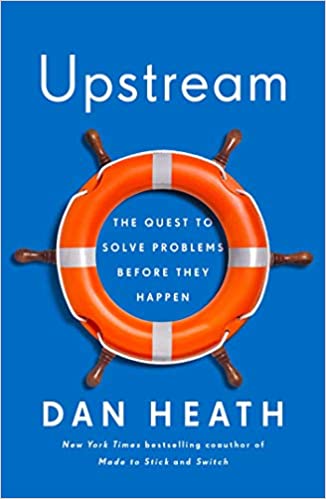You have /5 articles left.
Sign up for a free account or log in.
 Upstream: The Quest to Solve Problems Before They Happen by Dan Heath
Upstream: The Quest to Solve Problems Before They Happen by Dan Heath
Published in March 2020
Upstream is the fifth book by Dan Heath (the first four written with his brother) that I've read. The first book, Made to Stick, is probably the most aligned with ideas about how we learn and, therefore, is likely of most significant interest to academics. Subsequent Heath books (Switch, Decisive, The Power of Moments) are also terrific reads, being fine examples of the genre of simplifying and popularizing ideas from academia for a popular audience.
I'm pleased to report that Upstream continues the Heath brothers' run of thoughtful, thought-provoking and entertaining nonfiction books -- even if this latest installment was written by only one of the brothers.
Upstream takes a simple idea -- that proactively addressing issues and problems is better than doing so reactively and runs with it. Heath goes through a series of examples of the impact that a small number of dedicated individuals can have on solving seemingly intractable challenges. Examples include a city that was able to house all of its homeless people, a town that dramatically lowered rates of domestic violence and a state-led effort to reduce childhood death in auto accidents.
One of the most interesting stories that Heath tells is how Iceland was able to transition from a country with among the highest teen alcohol and drug abuse rates in the world to one of the lowest. The solution to Iceland's teen substance abuse problem was not more "your brain on drugs" ads but a coordinated societywide campaign to provide young people with a set of healthy alternatives to drinking (such as universal after-school sports).
In unpacking instances where individuals and organizations made big changes to problems that were not responsive to curative measures, Heath recommends three strategies for going upstream. These are: a) Be impatient for action but patient for outcomes. b) Macro starts with micro. c) Favor scoreboards over pills.
From a perspective at the intersection of learning science and organizational change (where I try to live), I like all three of these recommendations.
When it comes to solving the big challenges that we have in higher ed, we too often fail to go very far upstream. The reasons for our not getting to the root causes of issues in higher ed are varied. We are too busy. We don't think that what happens outside our colleges or universities is within our purview to address. The problems seem too large to tackle.
Take the perennial higher education issue of attrition. In the U.S., we do wonderfully well at getting young people to enroll in college. About two-thirds of high school graduates will enter some form of postsecondary education. We are much worse at getting those who start college to finish. Nationwide, only six in 10 students who enter college will graduate within six years.
Should academic leaders from every sector, even those with very high graduation rates, be working on postsecondary completion issues? If you care about the workforce's productivity and the well-being of individuals and families, then improving college graduation rates would be among the most important outcomes to work toward.
If we followed Heath's advice, we would all be doing what we can -- even if it is small -- to improve students' odds of graduation. We'd have a bias for action. The idea of "macro starts with micro" means that the place to start may not be in national policy (which should be addressed, mostly in student financing and debt relief), but with the students that we know. And rather than looking at only graduation rates, we should be looking to expose a more diverse set of data points that predict student success (scoreboards over pills).
All of these ideas may strike you as mere common sense. Fair enough. Upstream is not revolutionary in its thinking or its recommendations. What is excellent about Upstream is that it puts the ideas of shifting to a more proactive problem-solving posture into a framework that can be easily understood, discussed and hopefully acted upon.
Reading Upstream during COVID-19 can be a bit depressing, knowing what we know about how poorly our country was prepared for the pandemic from a public health perspective. Moving upstream to prevent the spread of the virus would have done so much more than throwing resources to cure those infected. As Heath writes about extensively in Upstream, the U.S. health-care system is, unfortunately, a poster child for downstream design.
Despite the COVID context, Upstream should make your list of light nonfiction reading. And I say "light" appreciatively in these times, as the last thing we need from our books nowadays is to get further depressed.
If you are an audiobook person, then Upstream is a definite read, as Dan Heath reads his book in an appealingly conversational and intimate manner.
What are you reading?








